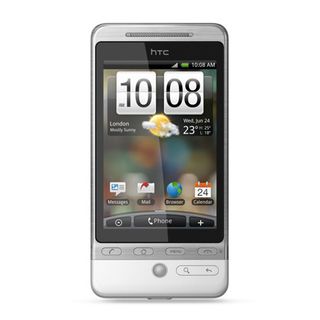The mobile divisions
Apple's iPhone has changed everything. To use a rather crude analogy, Windows Mobile is a peashooter compared to the iPhone's atomic bomb. Since its launch, it's laid waste to Microsoft's mobile ambitions and generated an enormous amount of light and heat.
Microsoft's response, Windows Phone 7, won't be out until next year – and by then Apple will have its fourth iPhone out. Right now Windows Mobile 6.5 is desperately outgunned, and equally desperate phone firms are building their own user interfaces to try and persuade the public that Windows Mobile is still relevant.
But it isn't working: according to the latest smartphone figures from analysts at Canalys, Apple is selling nearly twice as many iPhones as the entire Windows Mobile portfolio – 5.2 million in the second quarter of 2009 compared to 3.4 million for Microsoft – and boasts a global market share of 13.4 per cent to Windows Mobile's nine per cent.
Microsoft's share of the mobile market looks like being in terminal decline, and Windows Phone 7 will need to be extraordinary if it's going to reverse that.
Google's picking up market share too, although not to the same extent as Apple: its Android platform shipped on 1.1 million devices in the second quarter of 2009, giving it a 2.8 per cent market share.

More devices are incoming from firms including HTC and Motorola, which should boost sales further, but there's a problem with Android phones: as with PCs, manufacturers can make whatever devices they like to run the OS.
Get daily insight, inspiration and deals in your inbox
Get the hottest deals available in your inbox plus news, reviews, opinion, analysis and more from the TechRadar team.
When we previewed Android earlier this year, we predicted that it would suffer from uninspiring me-too devices, and that's exactly what seems to be happening: to date, Android phones are struggling to match, let alone beat, the iPhone. The applications matter too.
Apple leads the pack here with its App Store, but developers aren't entirely happy with it. The sheer volume of applications means that there's a race to the bottom, and applications need to cost 99 cents to stand a chance of selling.
Factor in the chaotic and controversial approvals procedure that often blocks or restricts perfectly respectable programs, and the demands of network operators to prevent applications such as Skype from working over 3G, and there are cracks in Apple's glossy facade.
That isn't a major problem just now – Apple has the customers, and we'll be amazed if its exclusivity deals make it into 2010 – but if Microsoft and Google raise their game it could mean that the best application developers jump ship. There's already quite a lot of turmoil in this fast-moving market.
Apple-watcher John Gruber has been contacted by a number of iPhone developers who have been approached by Microsoft in the hope that they'll build applications for Microsoft's platform.
The platform isn't Windows Mobile, though: it's the Zune. Either Microsoft intends to take the Zune into iPhone territory, or it's making its mobile strategy up as it goes along. It's anyone's guess which right now.
The forces' sweethearts
Every war has its soundtrack, and in this one it's being downloaded from Apple servers and played on Apple's software. Apple's iTunes dominates music – it's the US's largest music retailer – and in Europe its video selection is miles ahead of the competition.
The Zune is a decent effort in the US, but MP3 players are a declining, commoditised market: even Apple recognises that, hence the iPhone.
With the Zune, Microsoft is spending a great deal of time and money chasing a market that Apple is getting out of.
Apple TV is a dud, however, and in the US there are many more people watching video on demand via Media Center PCs or Xboxes. Despite its best efforts, Google isn't a player here (no pun intended): YouTube's copyright-flouting past means that mainstream entertainment firms are still wary of it, so they're putting their content on rivals such as Hulu instead.
There's one part of entertainment where Microsoft rules, though, and that's gaming. The Mac simply isn't an important gaming platform, whatever Mac fans might say. While the iPod/iPhone platform has become successful for casual gaming, it's no Xbox. That might change with the aforementioned Mysterious Magic Apple Tablet Of Joy And Wonder, but for console gaming it's a battle between Microsoft, Sony and Nintendo.
Microsoft also has Project Natal up its sleeve, the controller-free gesture recognition system that wowed this year's E3 show. If it's as good as Microsoft says it is – and developers seem to be backing it up here – then the company could be about to give Nintendo a serious headache.
The Apple Tablet That Cures All Ills may be important in another market, however: reading. To date, neither Microsoft nor Apple have dipped their toes into the ebook market, leaving it to the likes of Amazon with its Kindle.
Apple is certainly capable of 'doing an iPod' to the ebook market – moving in late and dominating the entire market – but for now that's simply speculation: there's no hardware to back up the claims that Apple's tablet is going to be a must-have.
The art of war
Predicting victors isn't easy, but we'll have a go. Barring a major cock-up, Apple will continue to sell stacks of iPhones. Google's Android will sell too, but not as well. Windows Mobile will continue to decline until Windows Phone 7 appears, and possibly for a while after that too.

Chrome OS won't be a big deal on desktops in the foreseeable future, Windows 7 and Office 2010 will sell stacks, and Apple will continue to dominate the market for really expensive personal computers.
Microsoft's web applications will get the numbers but Google will get the headlines, the Zune will never rule the world the way the iPod does and Windows will remain the operating system of choice for large enterprises.
Then again, wars aren't predictable. There are too many variables, and random events can easily snatch defeat from the jaws of victory. A single shot can start a war, and a single mistake can undo years of progress – so while our predictions seem safe from the certainty of our bunker, in the real world things are likely to be much more messy, more complicated and more surprising.
Which is, of course, what makes watching things unfold all the more interesting.
- 1
- 2
Current page: Mobile divisions and the forces' sweethearts
Prev Page The home front - and the battle of the skies